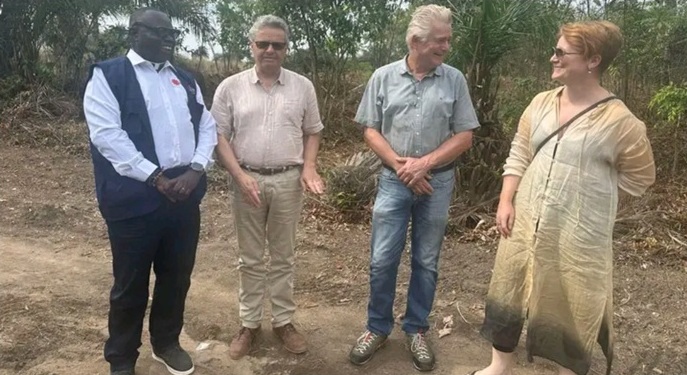By Hassan Osman Kargbo
Caritas Freetown, March 24, 2025, welcomed German Ambassador to Sierra Leone, Jens Kraus-Massé; and his wife, Sabine Yang-Schmidt, for a visit to their agricultural project aimed at promoting sustainable development in rural communities.
The visit, which also included Caritas’ executive team, showcased the project’s achievements, including the establishment of an Agricultural Training Center, improved farming practices, and a strong emphasis on empowering women and smallholder farmers through innovative agricultural techniques and partnerships.
The project, launched with funding from the German Embassy, has reached critical milestones since its inception, achievements including the construction of an Agricultural Training Center, which has become the heart of Caritas’ agricultural education programs.
The center offers specialized training for farmers, focusing on modern and sustainable farming techniques. By providing access to new knowledge, farmers are better equipped to enhance productivity, adapt to climate change, and build more resilient agricultural systems.
As part of its efforts to create a supportive infrastructure for farming communities, Caritas has also established animal shelters to house livestock, revitalized vegetable gardens, and helped form a local farmers’ association, initiatives aimed at not only to boost food security but also to create networks of collaboration among farmers, allowing for collective efforts to improve agricultural output and tackle common challenges.
The visit provided a firsthand look at the strides made in the agricultural sector in Sierra Leone, particularly in rural communities where access to resources and training is often limited.
Ambassador Kraus-Massé praised the progress made by Caritas Freetown, particularly in its commitment to empowering women and girls in rural farming communities. “We are proud to support initiatives that help strengthen local agriculture and provide new opportunities for women and girls to lead and thrive in their communities,” said Ambassador Kraus-Massé.
One of the key partnerships contributing to the project’s success is with Manos Unidas, a Spanish organization focused on international development. Through this collaboration, smallholder farmers are receiving invaluable guidance in the form of knowledge transfer, which focuses on adopting more efficient and sustainable farming practices. This knowledge exchange ensures that farmers are not only improving their crop yields but are also gaining financial independence and improving their overall quality of life.
The focus on empowering women is a significant part of the project’s impact. Many of the smallholder farmers involved in the project are women who have long been the backbone of agricultural production in Sierra Leone, yet often face systemic barriers that limit their access to resources, training, and decision-making power. Caritas Freetown has specifically tailored its programs to address these gender disparities by offering women-focused workshops and training opportunities.
While the project has made considerable progress, challenges remain. One of the main hurdles facing the agricultural sector in Sierra Leone is the unpredictability of climate change, which has had a negative impact on crop yields and food security. Additionally, limited access to financial resources and modern farming equipment continues to be a barrier for many farmers in the region.
Despite these challenges, Caritas Freetown remains optimistic and committed to working alongside local communities and stakeholders to overcome obstacles and achieve long-term, sustainable agricultural growth.
Looking ahead, Caritas Freetown is dedicated to further expanding its efforts, with plans to continue its work in advancing sustainable farming practices. The organization aims to improve livelihoods, create new economic opportunities, and support the agricultural sector’s transition to more sustainable, climate-resilient practices.
With the ongoing support of international partners like the German Embassy and Manos Unidas, Caritas is hopeful for a brighter, more food-secure future for Sierra Leone’s rural communities.
This visit underscored the importance of collaboration and the positive impact of international partnerships in advancing sustainable development goals.













